Muscle Tissue
Muscle tissue is a specialized tissue in the human body that is responsible for movement. There are three main types of muscle tissue: skeletal, cardiac, and smooth.
Skeletal Muscle Tissue
Skeletal muscle tissue is attached to the bones and is responsible for voluntary movement. It is striated and is made up of long, multinucleated cells called muscle fibers. Skeletal muscle tissue is under conscious control and is responsible for movements such as walking, running, and lifting weights.
Cardiac Muscle Tissue
Cardiac muscle tissue is found in the heart and is responsible for pumping blood throughout the body. It is striated like skeletal muscle tissue, but it is involuntary, meaning it is not under conscious control. Cardiac muscle tissue has intercalated discs, which allow for the coordinated contraction of the heart muscle.
Smooth Muscle Tissue
Smooth muscle tissue is found in the walls of hollow organs such as the stomach, intestines, and blood vessels. It is non-striated and involuntary. Smooth muscle tissue is responsible for involuntary movements such as peristalsis in the digestive system and the constriction and dilation of blood vessels.
Study Guide
- What are the three main types of muscle tissue?
- Describe the characteristics of skeletal muscle tissue.
- Where is cardiac muscle tissue found, and what is its function?
- What are the characteristics of smooth muscle tissue, and where is it found in the body?
- Give an example of a voluntary movement controlled by skeletal muscle tissue.
- Explain the role of intercalated discs in cardiac muscle tissue.
- What are the functions of smooth muscle tissue in the body?
◂Science Worksheets and Study Guides Sixth Grade. Introduction to Animals
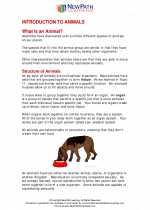
 Activity Lesson
Activity Lesson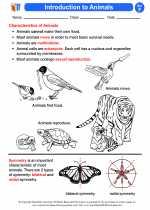
 Worksheet/Answer key
Worksheet/Answer key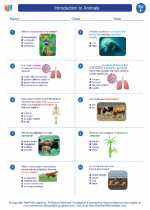
 Worksheet/Answer key
Worksheet/Answer key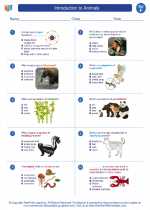
 Worksheet/Answer key
Worksheet/Answer key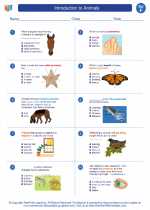
 Vocabulary/Answer key
Vocabulary/Answer key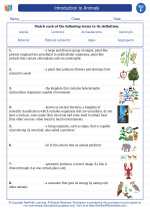
 Vocabulary/Answer key
Vocabulary/Answer key
 Vocabulary/Answer key
Vocabulary/Answer key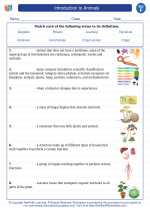
 Vocabulary/Answer key
Vocabulary/Answer key
